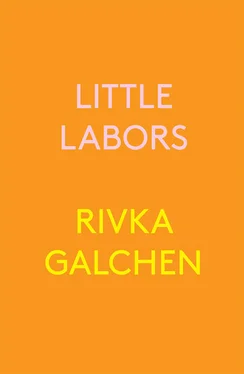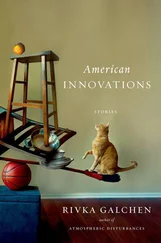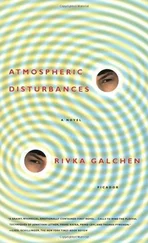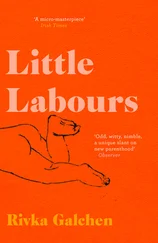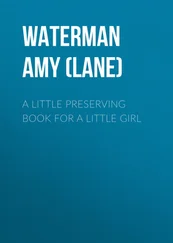Rivka Galchen - Little Labors
Здесь есть возможность читать онлайн «Rivka Galchen - Little Labors» весь текст электронной книги совершенно бесплатно (целиком полную версию без сокращений). В некоторых случаях можно слушать аудио, скачать через торрент в формате fb2 и присутствует краткое содержание. Год выпуска: 2016, Издательство: New Directions, Жанр: Публицистика, Критика, на английском языке. Описание произведения, (предисловие) а так же отзывы посетителей доступны на портале библиотеки ЛибКат.
- Название:Little Labors
- Автор:
- Издательство:New Directions
- Жанр:
- Год:2016
- ISBN:нет данных
- Рейтинг книги:5 / 5. Голосов: 1
-
Избранное:Добавить в избранное
- Отзывы:
-
Ваша оценка:
- 100
- 1
- 2
- 3
- 4
- 5
Little Labors: краткое содержание, описание и аннотация
Предлагаем к чтению аннотацию, описание, краткое содержание или предисловие (зависит от того, что написал сам автор книги «Little Labors»). Если вы не нашли необходимую информацию о книге — напишите в комментариях, мы постараемся отыскать её.
—a key inspiration for Rivka Galchen’s new book — contains a list of “Things That Make One Nervous.” And wouldn’t the blessed event top almost anyone’s list?
Little Labors
Genji
The Pillow Book
Little Labors — atomized and exploratory, conceptually byzantine and freshly forthright — delights.
Little Labors — читать онлайн бесплатно полную книгу (весь текст) целиком
Ниже представлен текст книги, разбитый по страницам. Система сохранения места последней прочитанной страницы, позволяет с удобством читать онлайн бесплатно книгу «Little Labors», без необходимости каждый раз заново искать на чём Вы остановились. Поставьте закладку, и сможете в любой момент перейти на страницу, на которой закончили чтение.
Интервал:
Закладка:
Helen Gurley Brown, author of Having It All : no children.
Katherine Anne Porter: No children, many husbands.
Alice Munro: Three children. Two husbands. First story collection at age thirty-seven.
Toni Morrison: Two children. First novel at age thirty-nine.
Penelope Fitzgerald: Three children. First novel age sixty. Then eight more novels.
John Updike: Many children. Many books. First book age twenty-five.
Saul Bellow: Many children. Many wives. Many books. First at age twenty-nine.
Doris Lessing: Left two of her three children to be raised by her father. Later semiadopted a teenage girl, a peer of one of her sons. Said, and had to repeatedly handle questions about having said, that there was “nothing more boring for an intelligent woman than to spend endless amounts of time with small children.” Many books.
Muriel Spark: One child, born in Southern Rhodesia during her marriage to Sydney Oswald Spark, who suffered from manic depression. She moved to London alone, leaving behind her husband. Her young son, also left behind, ended up in the care of some fruit sellers down the road, before he eventually moved to Scotland to live with his maternal grandparents. The child was later disinherited by his mother, who was annoyed, it is said, that he went around complaining that his mother wouldn’t admit that she was Jewish. Among other things. Many books.
Rebecca West: Had one child with H. G. Wells, to whom she was not married. Tried to convince the child that she was his aunt and not his mother (arguably for his own good). In 1955, the child wrote a roman à clef, Heritage , about the son of two world-famous parents; the mother does not come off well. For twenty-nine years, West successfully blocked publication. In 1984, when the novel was finally released, the child, aged sixty-nine, wrote an introduction to the book that further condemned his mother. The same year, the child published a laudatory biography of his mostly absent father.
Shirley Jackson: Four children.
J. G. Ballard: Widowed with three young children. Drank every day, was very productive, and called all of his children, in his autobiography of the same name, “miracles of life.” In describing seeing his children newly born, he wrote, “Far from being young, as young as a human being can be, they seemed immensely old, their foreheads and features streamlined by time, as archaic and smooth as the heads of pharaohs in Egyptian sculpture, as if they had traveled an immense distance to find their parents. Then, in a second, they became young.” Ballard also wrote with fondness about his time as a child in the internment camps of Shanghai.
Other people’s babies
Are often noted to not be of interest.
Other people’s babies, two
Every hour, about 14,500 babies are born.
Other people’s babies, three
When Lucille Ball was pregnant, her character on television was also pregnant, though the word pregnant, like a swear word, could not, at the time, be said on television; Lucy was, instead, expecting. She carried bags, and stood behind chairs and sofas, so as to protect viewers from a full visual sense of what was expected. Lucille’s husband on the show, Ricky Ricardo, was played by her actual husband, Desi Arnaz. In real life, Lucille Ball turned down show-business offers until someone was willing to also employ Desi Arnaz, who, probably because he was Cuban, was mostly denied employment. This dynamic is reversed in I Love Lucy . Ricky Ricardo is a successful bandleader at a nightclub, and a regular plot point is Lucy’s desperate attempts to be part of his show. The episode of I Love Lucy in which Little Ricky is born was watched by forty-four million Americans, in three out of every four homes that had a television, and was titled, simply, Lucy Goes to the Hospital.
Other people’s babies, four
For the first photos of the twins of Brad Pitt and Angelina Jolie, People paid fourteen million dollars.
Reversals
Murasaki Shikibu, of The Tale of Genji , and Sei Shonagon, of The Pillow Book, knew one another. They weren’t fond of one another. Shikibu was reserved and retiring, and more well-placed politically; Shonagon was witty and conversationally brilliant, and had a less stable position at court. Tutored by their fathers, both women knew Chinese, which was then the language of power and of politics (and of serious literature), and it was a language that women were not taught; women were supposed to speak and write only in Japanese; both women wrote their masterworks in Japanese, the insignificant language of women and gossip.
After The Pillow Book and The Tale of Genji, the third most noted and enduring book from the Heian period is The Tosa Nikki . It is a sort of travelogue, written in Japanese, by a male author writing under a female pseudonym, and its opening line is, “I hear that diaries are things that men make but let’s see what a woman can do.”
Mother writers
Both Murasaki Shikibu and Sei Shonagon had, it seems, babies. I don’t know to what extent ladies at Heian court raised their babies. From the books it is difficult to tell. But at least, it would appear, somewhat. Even empresses nursed. Shikibu in her diaries describes the patheticness of her empress’s baby not quite latching on. Shonagon complains in The Pillow Book of overly possessive wet nurses. Shonagon’s empress, a different empress than Shikibu’s, is sent away from court to have her baby, and though it was normal to be sent away, she was sent somewhere conspicuously low in status, she’s in political decline, and the passage in which Shonagon describes this pregnant exile is one of the most willfully cheerful passages in the whole book; that empress dies shortly after giving birth.
Today there are many writers who are mothers, sometimes writing specifically about motherhood, and in a genre that we recognize as literature. Or, at least, there are some mother writers, in this sense, if not many. There is Elena Ferrante, and Sarah Manguso. But among the mother writers of today probably two of the most celebrated are men: Karl Ove Knausgaard and, in his way, Louis C. K.
When the baby came home
I set her down in her crib, and she didn’t cry. Why, I wondered, is she not distressed? It’s as if she assumes that we will, of course, love and care for her. It seemed so strange for her to assume that. I respected her fearlessness.
When the empress moved
The passage in The Pillow Book titled “When the Empress Moved” tells of all the amusing and comic things that happen when the empress Teishi and her court (including Shonagon) are moved out of the main palace to another residence, one where the gate is not wide enough for the carriage to pass, where the master of the house doesn’t know the words for things, and where the court ladies are not given their proper privacy. In this passage, Shonagon does not mention that the empress Teishi is pregnant and ill, that another woman from another family was also recently named empress, that the move to a house far beneath her station was a political one, part of an attempt to shift power to a different family, and she also does not mention that the empress Teishi will soon die in childbirth, an event that has most likely already happened when the passage was written but which isn’t encompassed in the passage. Instead the writing is crowded over with laughter and “charm,” and scholars tell us that the passage has a special density of what in Japanese aesthetics is known as okashii —the amusing and the strange — and this high incidence of okashii (as opposed to aware , roughly translated to us as the pathos of things passing) often increases in The Pillow Book at moments when we might expect the opposite, at moments of distress and loss. (This is part of what makes me associate the book with what I think of as the “small” as opposed to the “minor.”)
Читать дальшеИнтервал:
Закладка:
Похожие книги на «Little Labors»
Представляем Вашему вниманию похожие книги на «Little Labors» списком для выбора. Мы отобрали схожую по названию и смыслу литературу в надежде предоставить читателям больше вариантов отыскать новые, интересные, ещё непрочитанные произведения.
Обсуждение, отзывы о книге «Little Labors» и просто собственные мнения читателей. Оставьте ваши комментарии, напишите, что Вы думаете о произведении, его смысле или главных героях. Укажите что конкретно понравилось, а что нет, и почему Вы так считаете.
